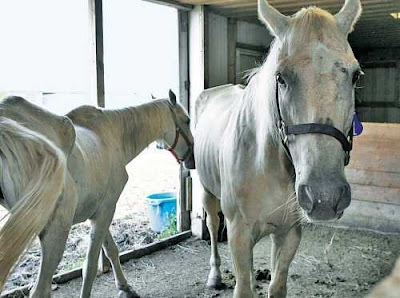from michigan.gov/mda
The Right to Farm Act affects everyone. Michigan agriculture is a $37.5 billion industry involving every county of the state. A wide variety of crop and livestock production strengthens our farm economy and helps to enhance the natural environment.View the Right to Farm Act.
The Michigan Right to Farm Act, P.A. 93, was enacted in 1981 to provide farmers with protection from nuisance lawsuits. This state statute authorizes the Michigan Commission of Agriculture to develop and adopt Generally Accepted Agricultural and Management Practices (GAAMPs) for farms and farm operations in Michigan. These voluntary practices are based on available technology and scientific research to promote sound environmental stewardship and help maintain a farmer's right to farm.
Why is this important?
According to the act, if a farm is found to be the subject of complaints, they should only have to show evidence that they are complying with GAAMPs, or if they are found to not be in compliance, they should be given thirty (30) days to comply.
From P.A. 93:
Sec. 4.
(1) ... the director shall investigate all complaints involving a farm or farm operation, including, but not limited to, complaints involving the use of manure and other nutrients, agricultural waste products, dust, noise, odor, fumes, air pollution, surface water or groundwater pollution, food and agricultural processing by-products, care of farm animals and pest infestations. Within 7 business days of receipt of the complaint, the director shall conduct an on-site inspection of the farm or farm operation.
(3) If the director finds ... that the person responsible for a farm or farm operation is using generally accepted agricultural and management practices, the director shall notify, in writing, that person, the complainant, and the city, village, or township and the county in which the farm or farm operation is located of this finding. If the director identifies that the source or potential sources of the problem were caused by the use of other than generally accepted agricultural and management practices, the director shall advise the person responsible for the farm or farm operation that necessary changes should be made to resolve or abate the problem and to conform with generally accepted agricultural and management practices and that if those changes cannot be implemented within 30 days, the person responsible for the farm or farm operation shall submit to the director an implementation plan including a schedule for completion of the necessary changes.
What are the GAAMPs for equines in Michigan?
You can view the full Generally Accepted Agricultural and Management Practices document at michigan.gov/mda under Care of Farm Animals.
A few excerpts:
Horses need to be adequately fed to maintain their body weight and health; however, idleness, overfeeding and obesity are undesirable and often harmful... Nutritional demands are usually met with good quality, properly harvested forages and pastures... Horses utilize hay or other roughages more efficiently than do other non-ruminants...
As a rule, horse owners can obtain adequate housing for their horses with uninsulated buildings. Healthy horses with adequate diet and good body condition only require protection from the wind. Pastures should have adequate shelter where horses can get out of the sun, wind, rain, and other inclement weather. These may include, but are not limited to, open barns, lean-to's, constructed windbreaks and woodlots.
Common fencing materials are wood, pipe, PVC, electrical wire or tape, smooth, non-electrical wire, rubber belt and woven wire. Bands of horses may be housed in open sheds.







